
Wednesday night was a late night, so Thursday morning we slept late, skipped breakfast and went straight to lunch. We had lunch at a Mexican restaurant with Ashley and her friends Natasha, Jeanie and Carey. And outside the front of the restaurant, I took a picture of Terry and Ashley and another friend - a life size statue of a mariachi singer:

Terry ordered a margarita (of course - gotta have a margarita at a Mexican restaurant), which came in a rather strangely shaped glass - it's pinched in near the bottom, and leans to one side at the top:

After lunch, Terry, Ashley and Natasha went to a perfume store called Hunnee B'z (here's a link), and then to Jeanie and Carey's house, where they spent the rest of the day socializing and ordering dinner from a local Italian restaurant.
In the meantime, I spent the rest of the day indulging my musical passions. First, I went to the Ryman Auditorium (w) for a tour.
Most people are aware that the Ryman Auditorium was the original home of the Grand Ole Opry (w). What most people don't know is that it was originally a church - the Union Gospel Tabernacle. The story is that Thomas Ryman, a wealthy Nashville businessman, one night attended a tent revival led by preacher Samuel Porter Jones. Ryman had gone to the revival with the intent to heckle, but instead got religion, and subsequently had the auditorium built in 1892 so that revival meetings could be held indoors instead of in tents.
The Tabernacle was renamed the Ryman Auditorium in 1904 after Ryman's death (he refused to allow it to be named for him while he was alive). In order to pay the bills, its owners began leasing it out for concerts, plays, lectures, etc. In 1943, the Opry (which had been on the air since 1925) moved in, and continued to broadcast from the Ryman until 1974.
After the Opry moved out, the Ryman was deserted for many years, and was almost demolished. But country music fans everywhere rallied to its defense, and eventually it was restored, and continues to function as a concert hall.
That's an extremely brief history - the Wikipedia article has a lot more information.
The tour that I took was a self-guided tour. After an introductory film, I got a brochure which guided me around the building. In addition to the usual displays of various artifacts in glass cases, there was a series of video presentations narrated by such celebrities as Trisha Yearwood, Keb 'Mo, Nicole Kidman, Sheryl Crow, Marty Stuart and Ricky Skaggs describing various aspects of the history of the Ryman.
I also saw these paintings of Mr. Ryman and Rev. Jones. Ryman is standing by the river, with a riverboat behind him - most of his wealth came from shipping - and Jones holds an open Bible in his hand:
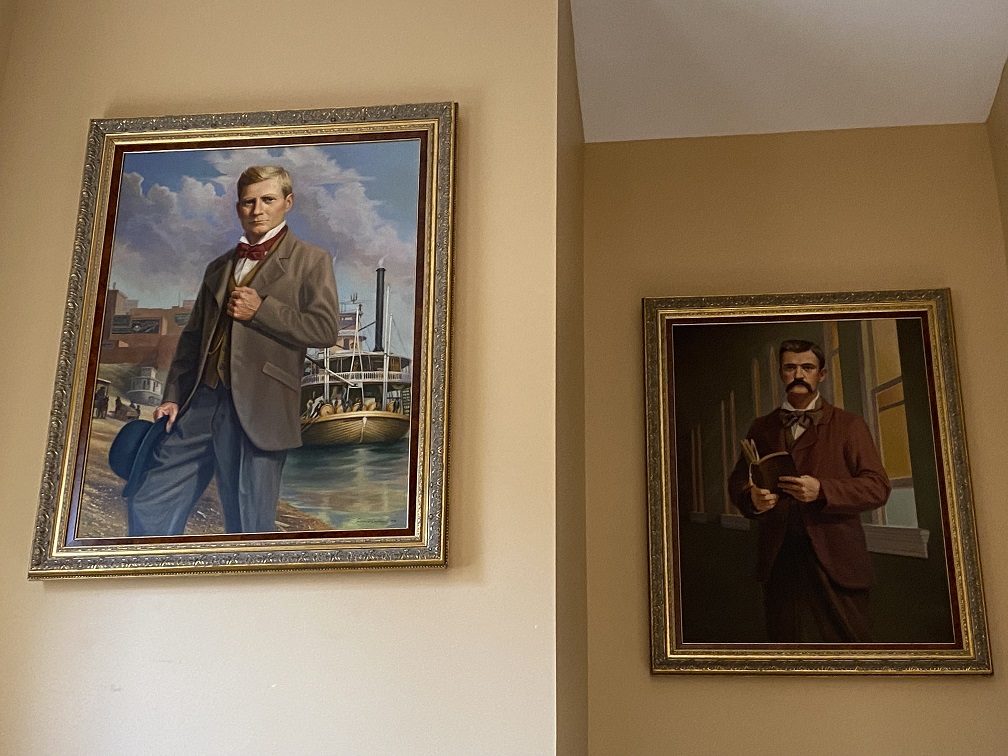
...and this impressive display of the names of all of the people, performers, plays and other productions that have taken the stage at the Ryman over the years. The names are written in a variety of sizes and colors, some horizontal, some vertical. From Theodore Roosevelt to Wayne Newton to Carol Burnett to Bruce Springsteen - hundreds, maybe thousands of names:
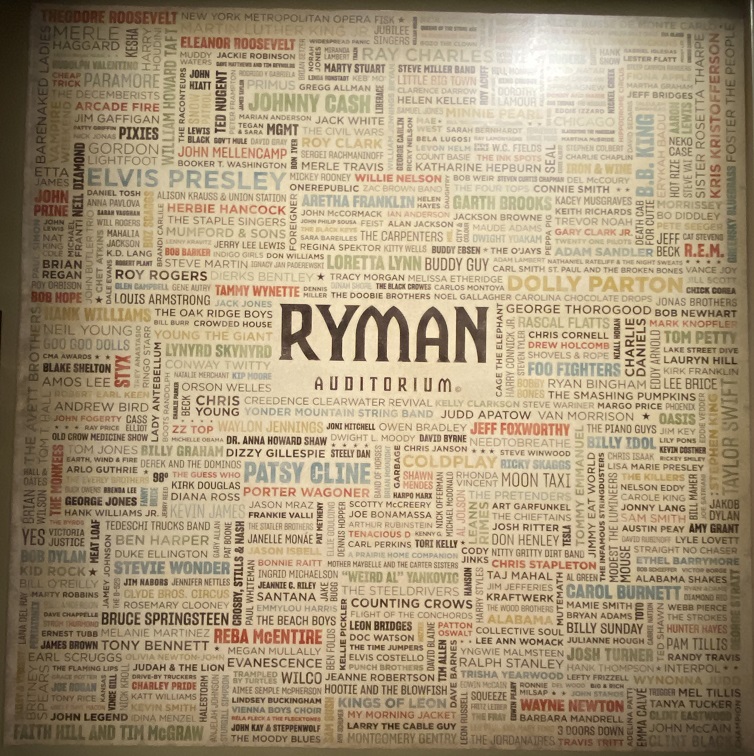
And here I am, making my debut on the Ryman stage!
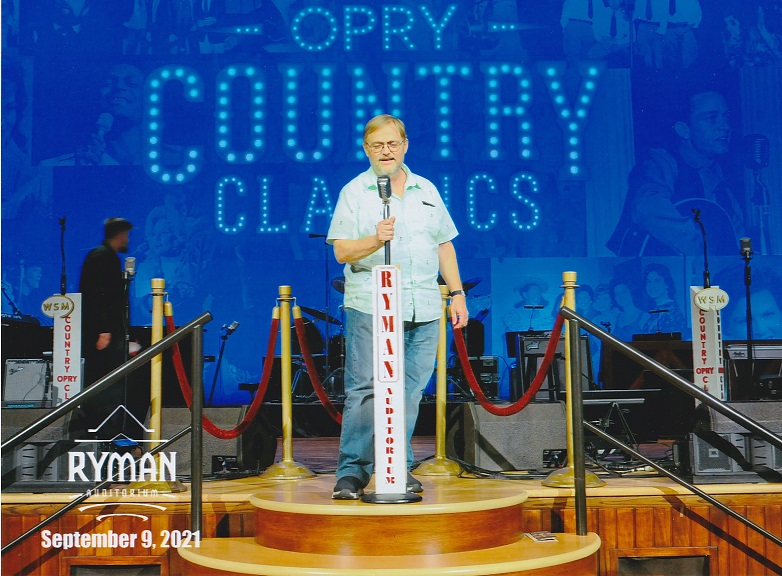
Okay, the mike wasn't live, and I wasn't really singing, but I can dream, can't I?
After the tour, I went and had dinner at a Cracker Barrel restaurant, and then drove back downtown to attend an Opry Country Classics show at the Ryman. The show was hosted by Larry Gatlin, and featured performances by The Gatlin Brothers, Charlie Worsham (who sang Harper Valley P.T.A, of all things), Mandy Barnett (who sang Help Me Make It Though The Night and Walking After Midnight, among others), Don Schlitz (who sang The Gambler, which he wrote), and Lorrie Morgan (who sang End Of The World and By The Time I Get To Phoenix).
Here's a picture of the inside of the auditorium. The stained glass windows harks back to the building's original incarnation as a church:

...and here's the stage, all set up for the performance, before the players took the stage. A big sign at the back says "Opry Country Classics":
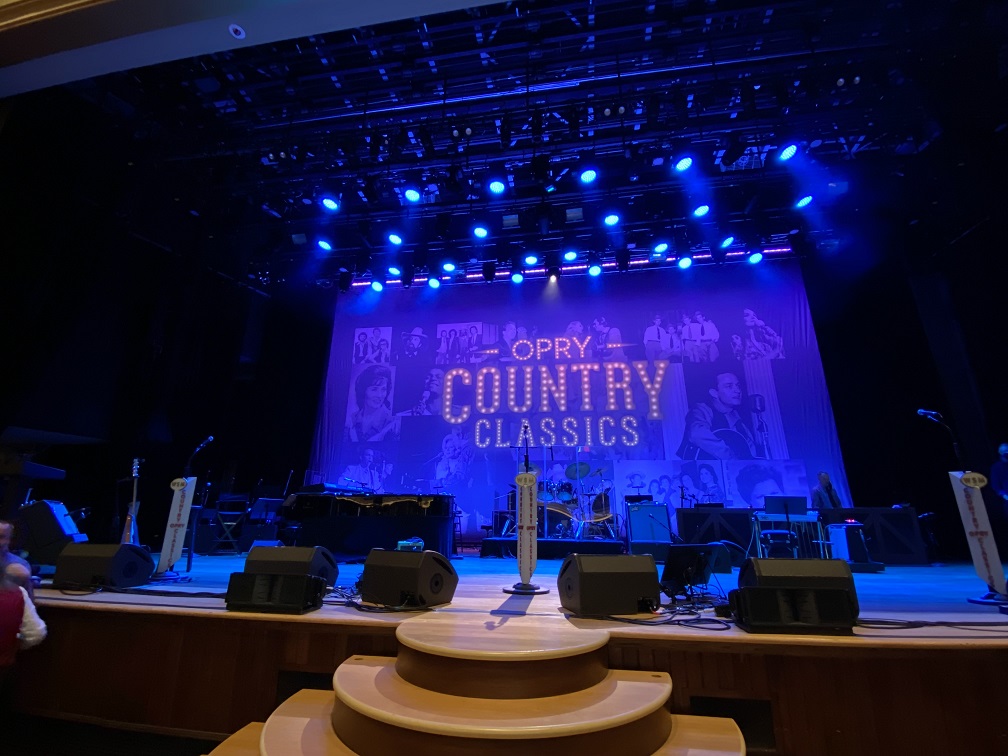
The Ryman had some competition that evening. Every day, when I walked from the hotel to the parking garage to pick up the car, I walked past the Bridgestone Arena, a large sports and entertainment venue. This day, I noticed this line of five large busses parked outside the arena:

...and I thought "Those look like tour busses." Not the kind that carry tourists, but the kind that carry an artist and his retinue on tours. So I checked the arena's website, and sure enough, that night there was a concert by country star Blake Shelton.
After the concert, I went club hopping on Broadway. Four or five blocks of Broadway in downtown Nashville are occupied by a seemingly endless succession of music clubs, bars and honky tonks. Here's a picture, showing the street all lit up with neon, with crowds of people on the sidewalks:

Each bar has a band playing, and every one has windows open to the sidewalk, and none of them have a cover charge. So downtown Nashville is a nonstop party every night - particularly on the weekend. I was there on a Thursday night, and it was crowded enough. Here's a picture I took on Saturday night - same street, same block, but this time, the street is closed to traffic, and the crowd of people fills the street as well as the sidewalks. Pandemic? What pandemic?
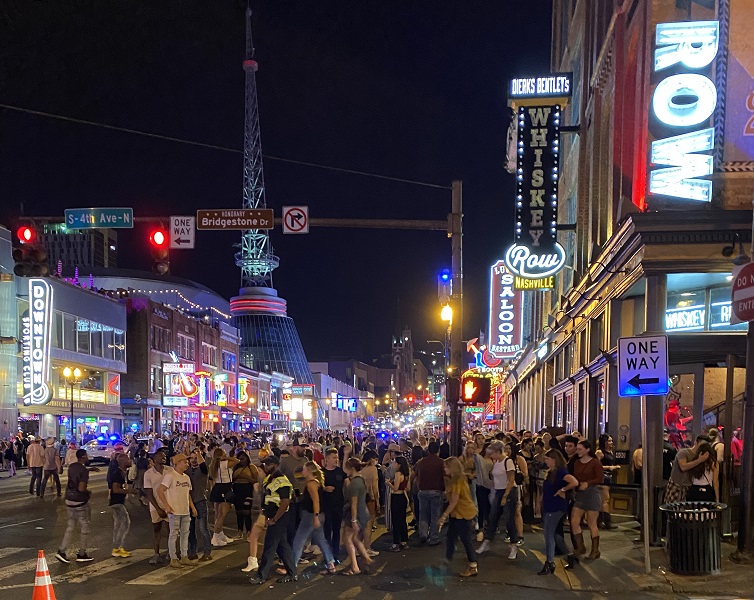
By way of contrast, here's the same scene in the daytime - no neon, no traffic, no people:

In addition to the foot traffic, there are a variety of carriages, busses, trucks, and even multi-passenger bicycles, carrying partiers from one bar to another. Here's a small horse-drawn Cinderella carriage:

Here's a gaudily painted open-air party bus, with "MusicCity.com" painted on the side:

And here's a bright red pickup truck, sponsored by a local hot chicken chain called Party Fowl (that's F-O-W-L), with the slogan "Cluck Yeah!" painted on the side, and a group of partiers in the truck bed:
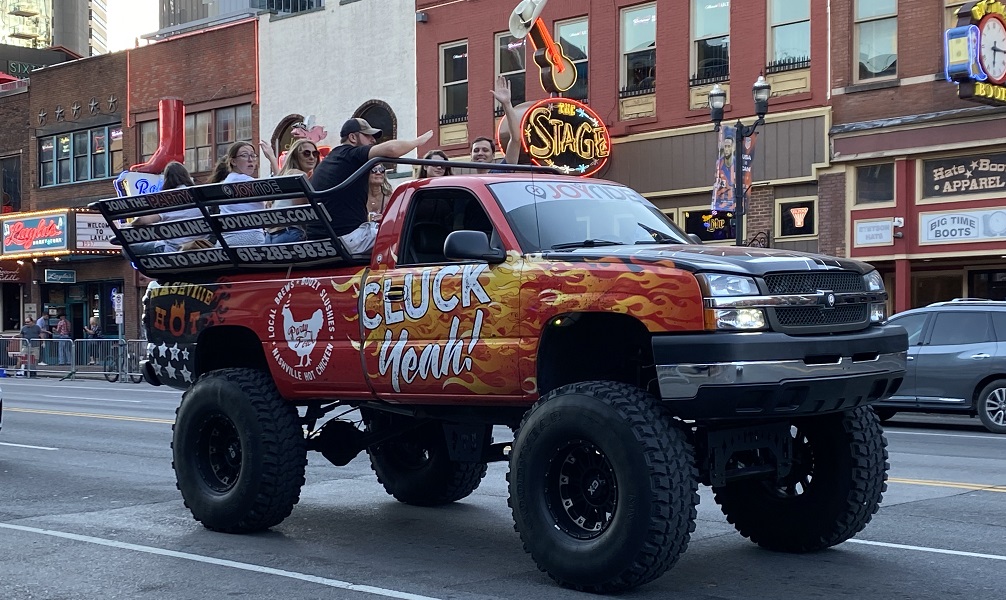
And a "bar bike" - a multi-passenger pedal driven vehicle. Six passengers per side, and they all have pedals.
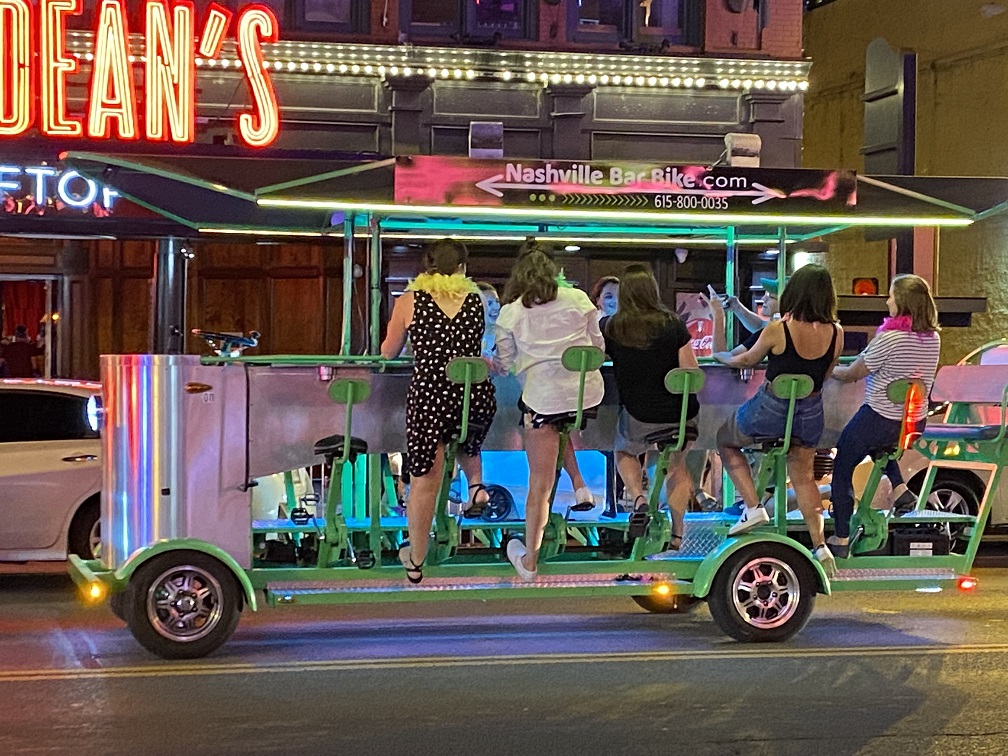
Downtown Nashville has also become a go-to site for bachelor and bachelorette parties. I saw several groups of young women, sometimes in matching outfits, partying hearty. Here's one such group on an open air bus:
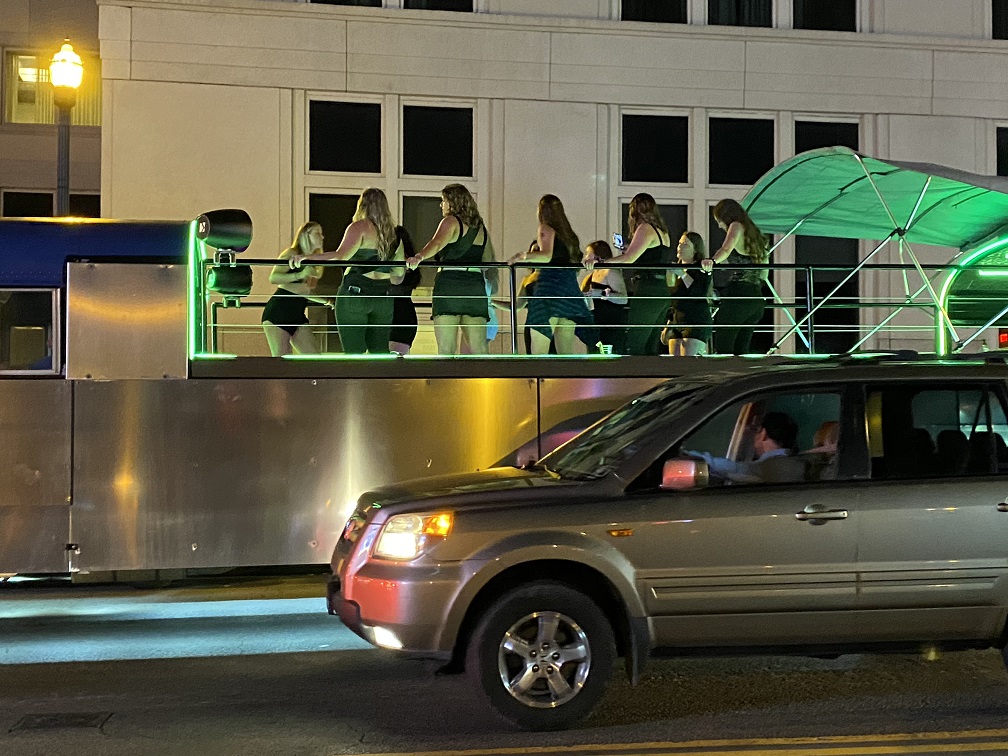
The bride to be was in white, of course, and you can just see a little bit of her peeking out from behind one of the other women. Unfortunately, they all had their backs to me. I was tempted to yell "Hey, girls!" to get their attention, but I chickened out.
I was also amused to notice the sentiments expressed on the back of this party wagon. On the back window are written the words "Buy the bride a drink," along with a Venmo address, and the hashtags #BoozyBrides and #SmashedInNash.:

Anyway, I spent a couple of hours walking up and down the street, stopping into a number of honky tonks, and listening to a song or two in each one. Here's a gallery - one picture of each band that I stopped and listened to:
 |
 |
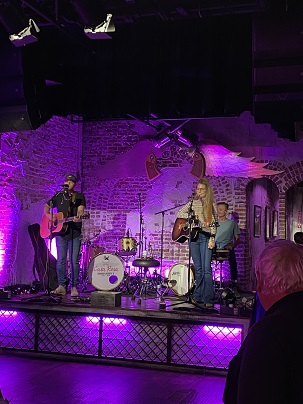 |
 |
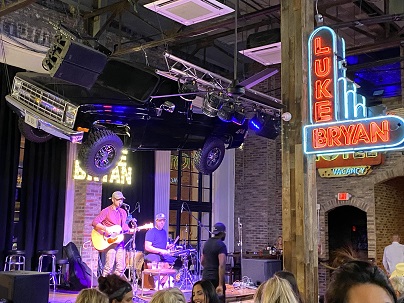 |
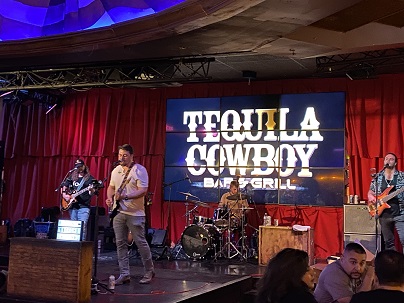 |
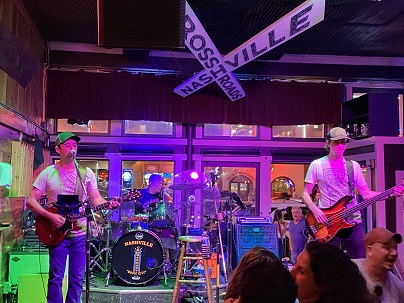 |
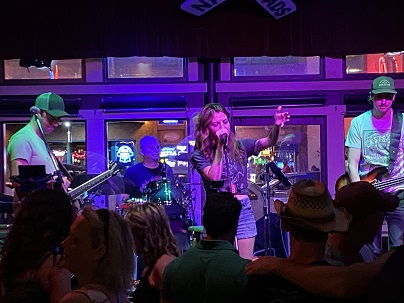 |
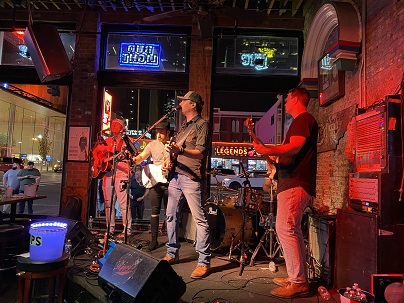 |
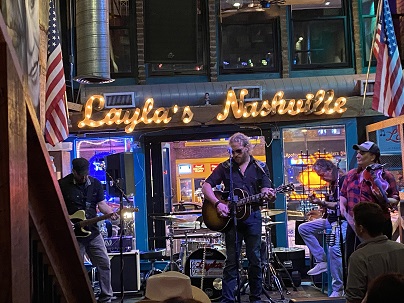 |
 |
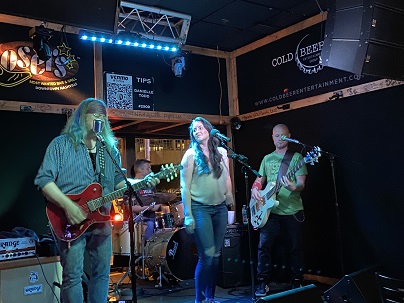 |
Okay, let's do a little number crunching here. There are 12 honky tonks represented in the above pictures. There were about as many more where I didn't stop, because at the time I came by, no band was playing, because one band had finished their set, and the next band was still setting up. So that's about 24 venues in just two blocks. And there are four or five blocks. That's an awful lot of music per square inch.